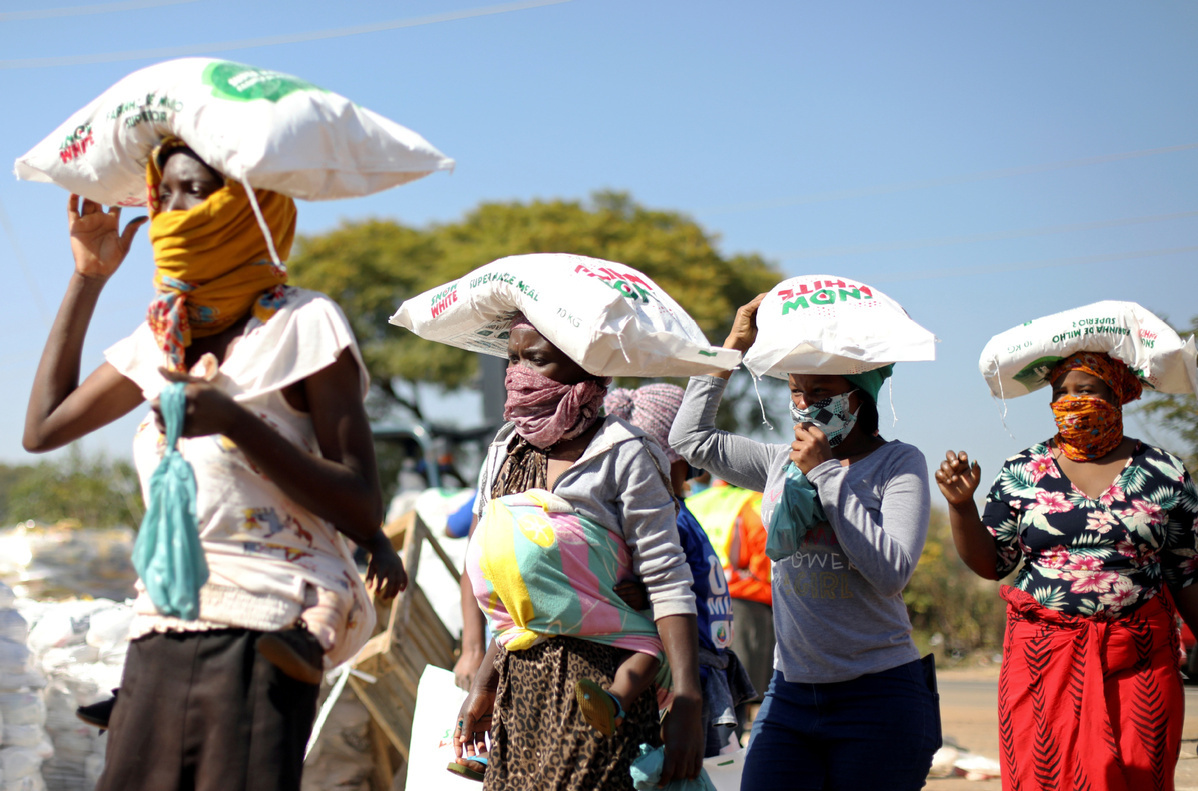
Women carry bags of maize meal on their heads as people queue to receive food aid amid the spread of the coronavirus disease outbreak, at the Itireleng informal settlement, near Laudium suburb in Pretoria, South Africa, May 20, 2020. (Photo: Agencies)
The United Nations Development Program has urged governments across Africa to lead the fight against a growing tide of false, inflammatory and misleading information that threatens to worsen the already severe impacts of the novel coronavirus pandemic.
The UN agency said national governments can mitigate the worst threats of misinformation, and in turn, more loss of lives and livelihoods, if they stand with their people to build a trusted relationship.
It said advice about coronavirus has been changing swiftly as medical understanding evolves, with the rapid evolution and the crippling impact on lives and livelihoods leading to a public thirst for information.
The agency said social media, informal news sources and fringe journalism have filled the void, often sowing fear, stigmatization, discrimination and confusion.
Achim Steiner, the administrator of the UN Development Program, said the tsunami of fake cures, scapegoating, conspiracy theories, and false news stories that have flooded the media in general and online platforms in particular have created a chaotic information environment, one that is undermining the effectiveness of public health measures.
This is in addition to resulting to real-life violence and discrimination, confusion, fear and, arguably, long-term societal harm.
"Learning the lessons from HIV and Ebola, we must join forces to reject misinformation and stigma, anchoring our responses and advocacy in science, evidence, human rights and solidarity. While many actors bear a responsibility to counter misinformation, real progress will not be achieved without government leadership," Steiner said.
He said the current challenge is that misinformation tools and tactics are now literally at the fingertips of anyone who wants to co-opt coronavirus for their own agenda, including government agencies.
For example, researchers at the Bruno Kessler Foundation analyzed 112 million public social media posts related to the pandemic and found that 40 percent came from unreliable sources, and that almost 42 percent of over 178 million tweets related to coronavirus were by bots.
Meanwhile, the Reuters Institute learned that about one-third of social media users have reported seeing false or misleading information about the coronavirus, while research by the Pew Research Center suggests people who receive their news primarily through social media are more likely to be exposed to false content.
The UN agency is working closely with national institutions, as well as with media and civic actors, to help the fight against the spread of misinformation, including supporting initiatives to use social media and websites to spread accurate information on coronavirus.
The UN Development Program is supporting Somalia's Ministry of Endowments and Religious Affairs to set up a website that will provide guidelines for safe burial techniques and help mobilize the religious community to donate and deliver supplies, like masks and soap, and to host various information resources.
In Guinea-Bissau, the UN agency and the Ministry of Health supported the development of a fact-checking site - www.nobaschecker.org - which helps Lusophone citizens access trustworthy information on coronavirus.
By building a wide community of fact-checking journalists, doctors, and economists from Guinea-Bissau and around the world, the site aims to fight disinformation about the pandemic by providing facts and verified news.
Malin Herwig, the AI director of the UN Development Program's Oslo Governance Center, said the best weapons any government can deploy now are transparency, diplomacy and collaboration.
"Governments can lead by example, demonstrating how to use technology with integrity. They can negotiate with big tech companies, promote national digital literacy campaigns, sponsor fact-checking efforts and allow journalists to do their jobs," she said. "This investment will pay off many times over in the form of inclusive and informed societies and engaged citizens."
Herwig said there is very little to gain for governments that conceal information, suppress opinion or sow divisions around coronavirus.
"In the immediate future, it will lead to overwhelmed health systems, angry and befuddled citizens, overstretched security forces and deepening divisions and inequalities. In the long term, it will continue to erode democratic values and principles, human rights and social cohesion," Herwig said.


